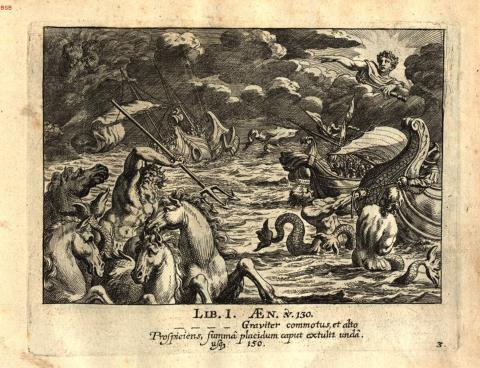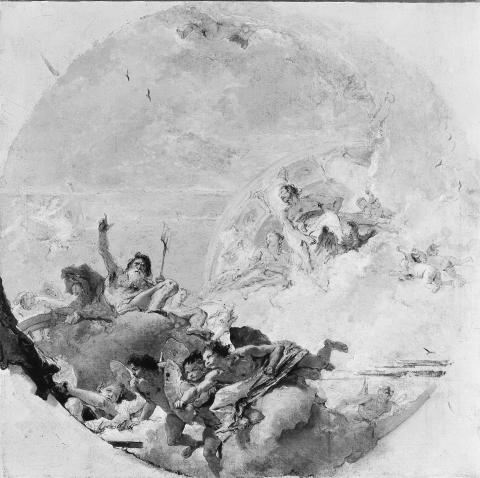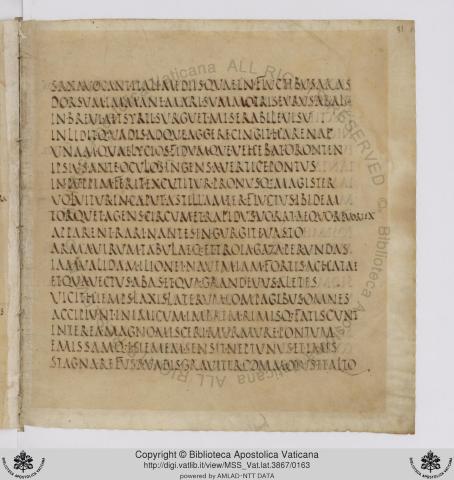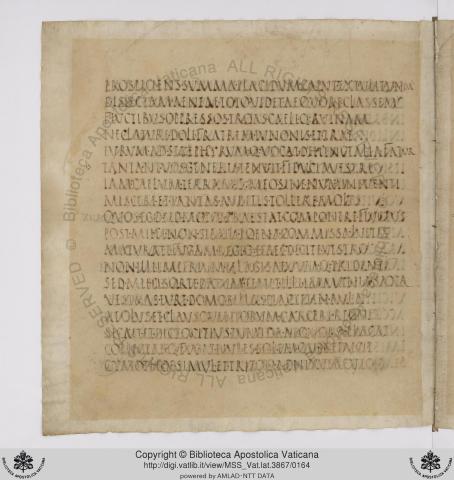CORE VOCABULARY
intereā: (adv.), amid these things; meanwhile, in the meantime, 1.418, et al.
murmur, uris, n.: a murmur, 6.709; uproar, 1.124; roaring, reverberation, 1.55; acclamation, applause, 5.369; thunder, 4.160.
ēmittō, mīsī, missus, 3, a.: to send forth, 6.898; hurl, throw, shoot, 11.676.
Neptūnus, ī, m.: Neptune, one of the sons of Saturn, and brother of Jupiter, Juno, and Pluto; identified by the Romans, as god of the sea, with the Greek Poseidon, 1.125.
stāgnum, ī, n.: a collection of standing water; a pond, pool, lake; sluggish water or stream, 6.323; pl., stāgna, ōrum, deep waters of the sea, 1.126; waters, 6.330. (stō)
refundō, fūdī, fūsus, 3, a.: to pour back or up; cast, throw up, 7.590; boil up, 1.126; flow back, overflow, 6.107; p., refūsus, a, um, thrown back, beaten back; poured back, flowing back upon itself, encircling, 7.225.
vadum, ī, n.: a ford; a shallow, shoal, 1.112; sand-bank, 10.303; shallow water, 11.628; bottom, depth, 1.126; water, tide, stream, 6.320; water of the sea, 5.158; wave, sea, 7.198.
graviter: (adv.), heavily; deadly, 7.753; greatly, deeply, 1.126; heavily, mournfully, 2.288. (gravis)
commoveō, mōvī, mōtus, 2, a.: to move completely; move rapidly in procession, 4.301; rouse, start from cover, 7.494; shake, stir, 5.217; disturb, move, 1.126; agitate, terrify 1.360.
altum, ī, n.: the deep; the lofty; the deep sea, the main, the deep, 1.3; the sky, heaven, air, 1.297; from far, far-fetched, remote, 8.395. (altus)
prōspiciō, spexī, spectus, 3, n. and a.: to look forth, forward; to see afar, in the distance, descry, see, 3.648; to look forth or out upon, w. dat., 1.127. (prō and speciō, look)
placidus, a, um: adj. (placeō), gentle, calm, tranquil, peaceful, serene, 5.848; inactive, idle, 9.187; friendly, propitious, 3.266; (adv.), placidē, gently, softly, quietly, calmly, 5.86.
extollō, 3, a.: to lift up; (fig.), laud, extol, 11.401.
dīsiciō, iēcī, iectus, 3, a.: to throw, cast asunder; overthrow, demolish, 8.355; scatter, disperse, 1.70; cleave, 12.308. (dis- and iaciō)
Aenēās, ae, m.: 1. A Trojan chief, son of Venus and Anchises, and hero of the Aeneid, 1.92. 2. Aenēās Silvius, one of the Alban kings, 6.769.
opprimō, pressī, pressus, 3, a.: to press against; press down, overpower, overwhelm, 1.129; come upon suddenly; surprise, 9.398. (ob and premō)
Trōes, m.: (subst.), the Trojans, 1.30, et al. (Tros, one of the kings of Troy)
ruīna, ae, f.: a falling down; fall, overthrow; convulsion, commotion, destructive force, 1.129; onset, shock, 11.613; pl., ruin, overthrow, destruction, 1.238; dare, trahere ruīnam, to fall in ruins, 2.310; bring destruction, 12.454. (ruō)
nec or neque: (adv. and conj.), and not; neither, nor, 1.643, et al.; in prohibition, 3.394, et al.; neque (nec) — neque (nec), neither — nor, 5.21, et al.; nec — et, or -que, may be rendered neither — nor, 12.801; 2.534; nec nōn, and also, nor less, 6.183; nec nōn et, and also, 1.707.
Iūnō, ōnis, f.: Juno, the Sabine and Roman name for the wife and sister of Jupiter, daughter of Saturn, 1.4, et al.; Iūnō īnferna, the Juno of the lower world, Proserpine, 6.138.
Eurus, ī, m.: the southeast wind, 1.85, et al.; wind, 1.383, et al.
Zephyrus, ī, m.: Zephyrus or Favonius, the god of the west wind, 2.417, et al.; west wind, 4.562; wind, 10.103.
dehinc (often monosyll.): (adv.), from this place; from this time; thereupon, then, 1.131.





